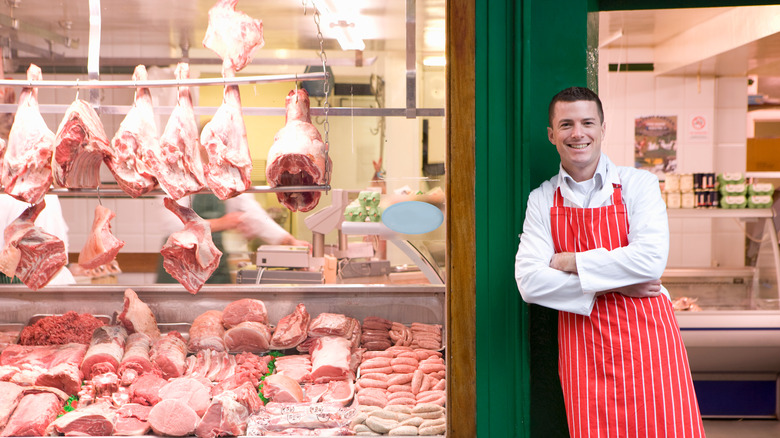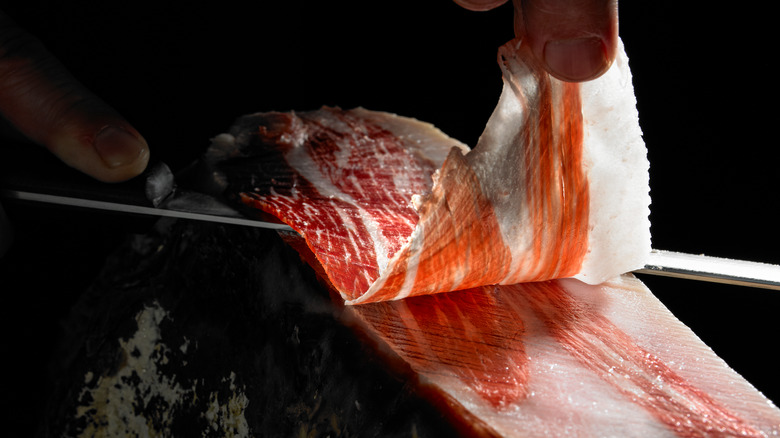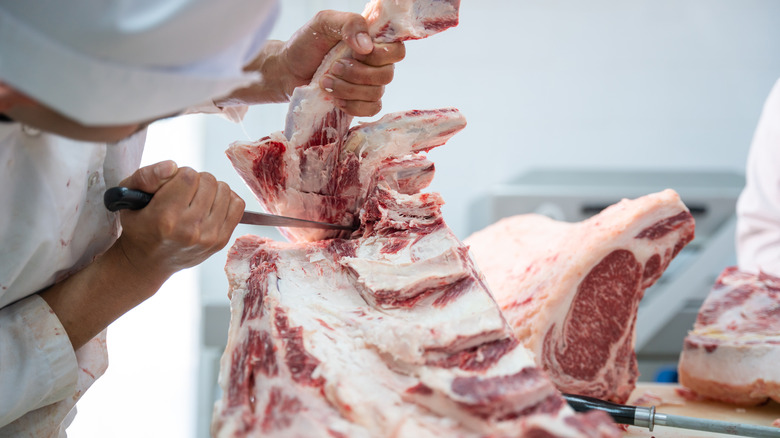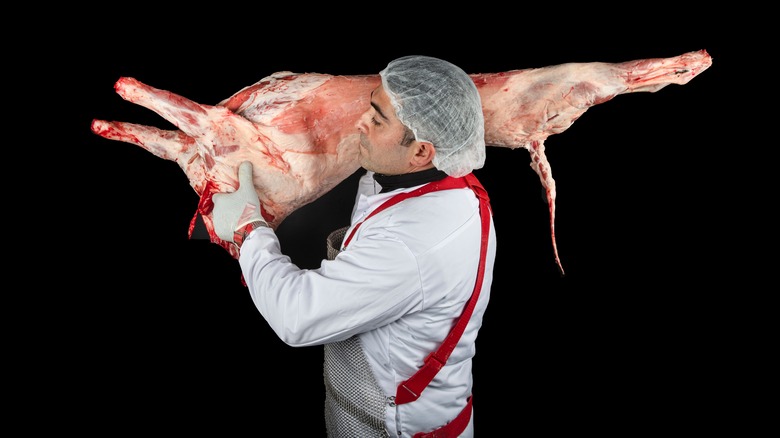How Much Money Do Butchers Typically Make?
In February, 84 top butchers will gather in Nashville to compete for the title of Texas Roadhouse Meat Cutter of the Year, according to local news outlet WKRN. The winner will not just distinguish themselves as a cut above the rest — they also get a $20,000 prize. For some butchers and meat cutters, that's almost as much as their annual salary. According to figures from the Bureau of Labor Statistics, the annual wage for about 10% of those workers is $22,210. The median yearly wage is $32,900, but top earners can pull in $50,440. Butcher assistants in the United States get paid even less, according to Zippia — their starting salary averages out to $20,000 and their overall average salary is $30,661.
As of May 2020, there were over 142,000 butchers and meat cutters employed in the United States, mostly at food and beverage stores but also in the restaurant and animal slaughtering and processing industries, among others. If you want to earn big as a butcher, head north; BLS data shows the top paying state was Alaska, where the annual mean wage was more than $49,000. If you want more community, go to California, which employs nearly 26,000 butchers and meat cutters, the highest of any state in the nation.
Wages have been increasing for butchers, but the irony is they haven't been going up nearly as fast as the price of the meat they're cutting. From 2004 to 2020, salaries for butchers and meat cutters rose about 26%, according to Recruiter.com. But as numbers from the Official Data Foundation show, the price of meat has risen nearly 50% in that same period of time.
Butcher or meat cutter?
Although the jobs are similar and there can be overlap, there is a distinction between butchers and meat cutters. Butchers tend to take a carcass and divide it into smaller pieces called primal cuts, while a meat cutter will take those smaller chunks and separate them into the cuts we typically see at the meat counter, says Your Meat Guide.
Meat cutters might earn $2-$5 less an hour than a butcher working at the same place. Skilled butchers can earn more than $20 per hour and "will not go short of work," Your Meat Guide notes, adding that independent stores that need butchers with varied skills are likely to pay more than supermarkets. There are even traveling butchers who go from farm to farm to cut up animals on site and can likely charge more than even those in independent shops.
Still, the industry isn't totally settled on the difference in meat cutters and butchers. A Reddit user named "can-o-ham" says they consider themselves both. "I've worked killing, quartering, and doing retail cuts," they say. But "I've always used them independently since there doesn't seem to be a better distinction. If I advertised help wanted for a true butcher and got a retail meat cutter then there would still be training involved."
What's it like to be a butcher?
Being a butcher isn't an easy job. There's pressure. They work with expensive cuts of meat, and as Seattle butcher David Zarling told Thrillist, making one little mistake can cost the shop an entire cut of meat. They've got to know details like the specific temperature to store meat at, what mold and bacteria look like on aged meat, and what the latest food trends are. They also have to know how to properly divide up a carcass — there are more than three dozen types of cuts a butcher must know for a cow alone.
The work is also cold, physically demanding, and risky. Butchers have to lift and move heavy carcasses that are stored at around 40 degrees Fahrenheit, the BLS says. "Butchers have one of the highest rates of injuries and illnesses of all occupations," the BLS writes. "These workers use dangerous tools, such as sharp knives and meat saws, and work in areas with slippery floors and surfaces."
Although butchers don't need a college degree, there's still plenty of learning to do. Workers often enter the business as a meat cutter and become a butcher after months or more than a year of on-the-job training, per the BLS. In European butcher's guilds, apprentices could end up working for a master butcher for years before graduating to journeyman, who would need a couple years of further training before becoming a master and owning a shop or slaughterhouse. "They would learn all facets of the industry including slaughter, selection of animals, food safety and disease detection," says The Butcher's Info Blog. "They may learn sausage, ham, smoking, curing and various preservation techniques."
Why be a butcher?
With the dangerous, difficult work and inflation cutting their pay faster than they can break down a beef tenderloin, there's little wonder that many butchers have beef with their jobs. CareerExplorer found that job satisfaction in the industry was very low, with workers rating their career happiness 2.6 out of five stars, leaving them in the lowest 6%. "Butchers are one of the least happy careers in the United States," the website says.
But money isn't everything, and not all butchers are dissatisfied. "I'm exactly where I want to be and doing exactly what I want to do," Matt Levere, who has worked as a butcher after taking a six-month apprenticeship program, said in a 2021 interview with the Bureau of Labor Statistics. "I feel like I'll be happy to be a butcher for the rest of my life. It's a nice skill set that I've been able to feed and support myself with."
Other perks of being a butcher include low barriers to entry, the ability to open your own butchery, and a high level of job security, according to Job Evaluator. And of course, there are the golden handcuffs of the low-paying profession: meat discounts. There are certainly both pros and cons to being a butcher, but if you like the idea of a physical and demanding job where you get to meet a lot of people and learn a specialized skill, don't let money stand in your way.



